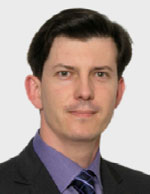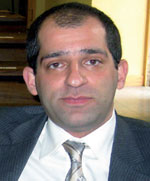Faculty of Public Administration: New International Perspectives
On October 28th and 29th the first French-Russian Conference took place at the Higher School of Economics, involving discussions on double-degree cooperation programmes and PhD and research collaboration in public administration. Is there bureaucracy in France and what should future officials know? Marcel Guenoun, Professor at Paul Cezanne Aix-Marseille 3 University, and Jean Michel Eymeri Douzans, Deputy Director of SciencePo Toulouse, answered those questions.
— Can you tell us something about your impressions of the conference. What did you manage to discuss there?
: As part of the session which were directly involved with, as speakers, we discussed the latest trends in public administration. Russia and France have problems with similar roots, and in both countries the state is very centralized and we need to fight bureaucracy.
Jean Michel Eymeri Douzans
At the same time, we have another important thing in common – the concept of long term potential. In some Anglo-Saxon countries they expect to get return on investments in the public services system within just 4 or 5 years, but for us, this period is too short. We are countries with a long history. We know that change take time, and, as our colleague Alexey Barabashev, Dean of the HSE Faculty of Public Administration, said addressing those who expect quick results, ‘you want the boat to change its course quickly, but we’re not talking about a boat, rather a supertanker, and it is very difficult for a complex organization’. It is funny, but I always use the same metaphor with my students: the system of public administration is a large tanker, and if you want it to turn left or right, you’ll have to wait. This is because we’re not dealing with technology, but with people – ministers, officials, etc.
Marcel Guenoun: Speaking about the conference, I would add that it is rare in our academic world that an event is so well organized, and where the participants of each session are chosen so that their speeches complement each other. In fact, we in France are sometimes not very well informed about international progress, and it was interesting for us to find out what reforms are taking place in Russia, since it can stimulate new research.
— How did the idea of a double-degree programme with our Faculty of Public Administration come up? What preceded it? And how successful is current cooperation?
Jean Michel Eymeri Douzans: Negotiations for our cooperation started two years ago, when Robert Fouchet, Director of Paul Cezanne University, visited the Higher School of Economics. On the Russian side, Sergey Efremov, analyst at the HSE Center for cooperation with France and French-speaking countries (French Center), is coordinating the cooperation. Through our mutual effort, in January this year we welcomed a delegation of nine students of the HSE Faculty of Public Administration for an internship. During the week in Aix-en-Provence they listened to some introductory lectures on French public administration and reforms in central and local government.
We have always tried to attract international students. We have exchange programmes with Chinese universities, universities in Rome, Switzerland, as well as ties with Liverpool Business School and the Center for Regional Public Administration Studies in Birmingham, Great Britain. Through these we try to create a network of universities conducting research in public administration. And we are interested not only in West European, but also in Eastern European countries, especially Russia.
Marcel Guenoun: We think that the Higher School of Economics is the best place to start development of such a network in Russia. But we do not expect Russian students to learn anything after 12 lectures in France; this task will demand longer internships. And hopefully our students will visit Moscow and HSE branches in other regions to cement this partnership. During the next few months an agreement on the creation of a double-degree programme in public administration will be signed.
Jean Michel Eymeri Douzans: I must agree with my colleague’s words: SciencePo also thinks of cooperation with the HSE Faculty of Public Administration as an important and promising area, not only in double-degree programmes, but also as a platform for comparative research and joint PhD and thesis defenses.
— Do you mean that you are planning research cooperation between your universities and the Higher School of Economics?
Jean Michel Eymeri Douzans: Yes, we shall develop similar programmes of cooperation in SciencePo in Toulouse, in relation to PhD courses, and also run some professor exchange programmes. I am speaking mainly of public administration and public policy, but we may well also include the sphere of media (there is a laboratory within our Institute which works on studies in political communications). Our Institute also has agreements on student exchanges with Lomonosov Moscow State University and Saint Petersburg State University, so I hope your university will make it a network. This is likely to be the topic of our next visit in June.
Marcel Guenoun: We are looking forward to welcoming the next delegation of HSE students in February – March 2001, and we have high expectations for this visit. As Jean Michel has already said, we shall develop partnership in PhD programmes to conduct some comparative research jointly with Russian researchers. I think this research will be related to state programmes, public sector reforms, local administration problems, bureaucracy, etc.
— By the way, speaking of bureaucracy in public and local administration, what in your view needs to be done to combat it?
Jean Michel Eymeri Douzans: People have to fight bureaucracy in all countries, and this problem is related to the problem of administrative costs. In fact, today we demand our state organizations to do more for less money. Of course, we can use IT, but government and administration is not Mount Parnassus: they work only if you fundamentally change their management, philosophy and strategy.
The strategy for public services reform should be long-term: not merely within 5 years, but for as long as 25. You have democracy, elections etc – it is all good, but to alter the complex structure of government apparatus you need at least twenty years. It is easy to elaborate a good strategy, to advertise it in newspapers and other media and claim: look, what wonderful things we are doing. This is Tony Blair’s style. But to understand how to implement it in practice is the most difficult part.
Such question is relevant not only for Russia and France, but also for Germany and other countries: how to reform the administration in 20 years, what political will do you need for it? No one has answered this question yet. Politicians change, as well as their priorities, but to carry out institutional reform, strong power is needed. If you expect that an incoming politician can sign a law on such reform, and then other people will implement it, it won’t work.
— Last year a report was published by Joseph Stiglitz’s Commission created on the order of Nicolas Sarkozy to develop new indicators of public wealth, instead of GDP. In your view, will anything change now in the public sector in France?
: To me one thing is obvious: the crisis has changed absolutely nothing. I am not sure anything will happen right now. Yes, we have a vision of what we want, but global regulating institutions are still not working towards it. Currently the public administration has to deal with public debt, the crisis, and it is very hard to reduce costs.
Marcel Guenoun
For example, the British Prime Minister claims: ‘I shall reduce costs in the next 4 years, I shall reduce the number of officials…’ This seems to be something new, but this has happened before. American President Jimmy Carter reduced the staff of officials in the U.S. by 7000 people over three years in the 1970s. And what do you think happened three years later? They hired 7000 people to work in the public administration system, but on different working contracts. So, we need public services, any society and the capitalist system as a whole does.
I think that the main problem we have to deal with today is failing trust in the government. In the majority of countries it is normal for a person to use, for example, utility services – water, gas, electricity. They also are part of public services. But the more public employees do, the more they are accused. This is a paradox, but it is impossible to teach people: ‘Look how good it is! It is a public service!’ Is it possible to make people value what they already have? And what can they lose if they elect a politician lacking a long-term view of the future? This question also hasn’t been answered yet.
— Back to the students, future experts in public administration, what should they study, in your view?
Jean Michel Eymeri Douzans: First of all, history. We have done a comparative analysis and proved to ourselves: public service delivery largely depends on national tradition, the role of the state is not similar in the U.S., Russia and France. It is necessary to remember that the solution of similar problems will depend on national specifics.
The second is what is today called with a trendy word ‘benchmarking’. This is a method allowing you to choose an idea, procedure etc. and build them in your context. And this is related to the first block: it is impossible to take an off-the-peg solution from the U.S. or Denmark and implement it in France, or take something from Spain for Sweden, as it is often offered by consulting agencies. But, of course, we should learn from others. And we should not think that the importing and exporting of various models started with globalization 20 years ago – it existed as far back as the Middle Ages. And in Russia, Peter the Great borrowed elements from the West, and Napoleon used the Prussian army as a model…
— Can we say that the students who participate in the programme will also be involved in a cultural exchange? And what impressions of Moscow do you yourself have?
Marcel Guenoun: As for the students, definitely yes. Students often hear from their teachers: ‘We live in an age of globalization, we should develop connections with foreigners, benchmarking…’, but often it is only words, just the theory. In the SciencePo Institute in Toulouse you look around and see that Chinese, Russians, Poles, Canadians and Americans all study there – and globalization is truly beginning.
We might think that a country is closed, or developing, or ruined by consumer culture, but when you meet living people, your prejudices are not confirmed. And we start learning something as soon as we confront our stereotypes.
Jean Michel Eymeri Douzans: And our impressions of the Russian capital are very good. Our ‘cultural programme’ includes a number of museums, since for me personally, this is my first visit to Moscow.
Marcel Guenoun: But definitely not the last!
Maria Saltykova, specially for the HSE News Service

